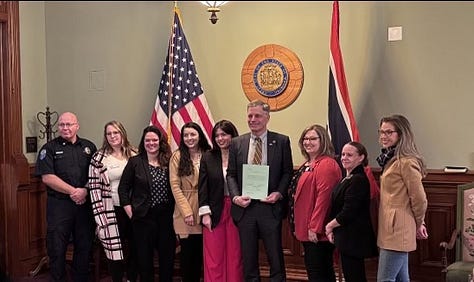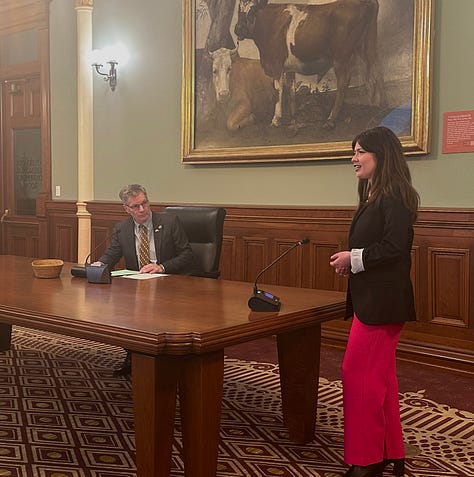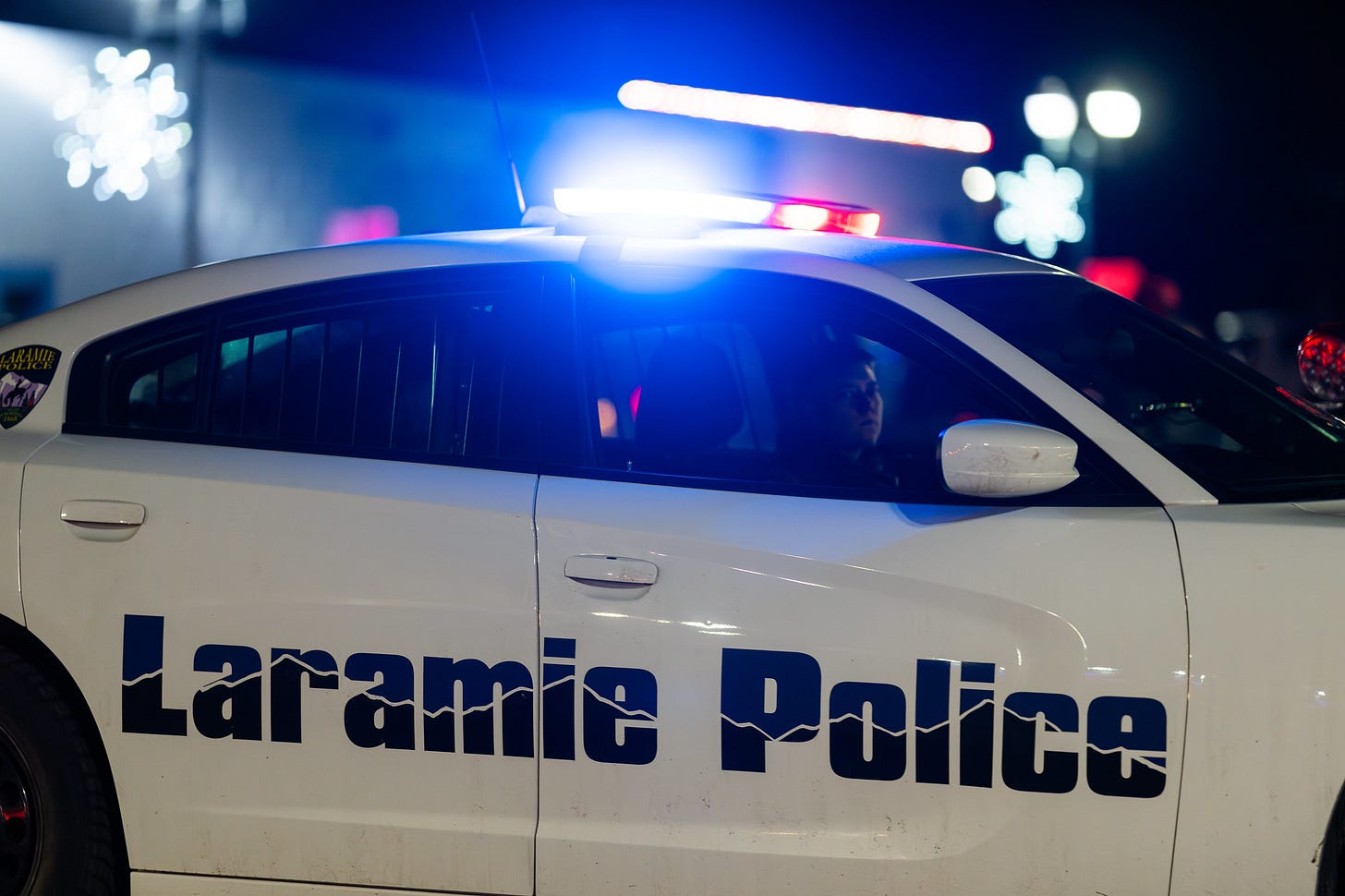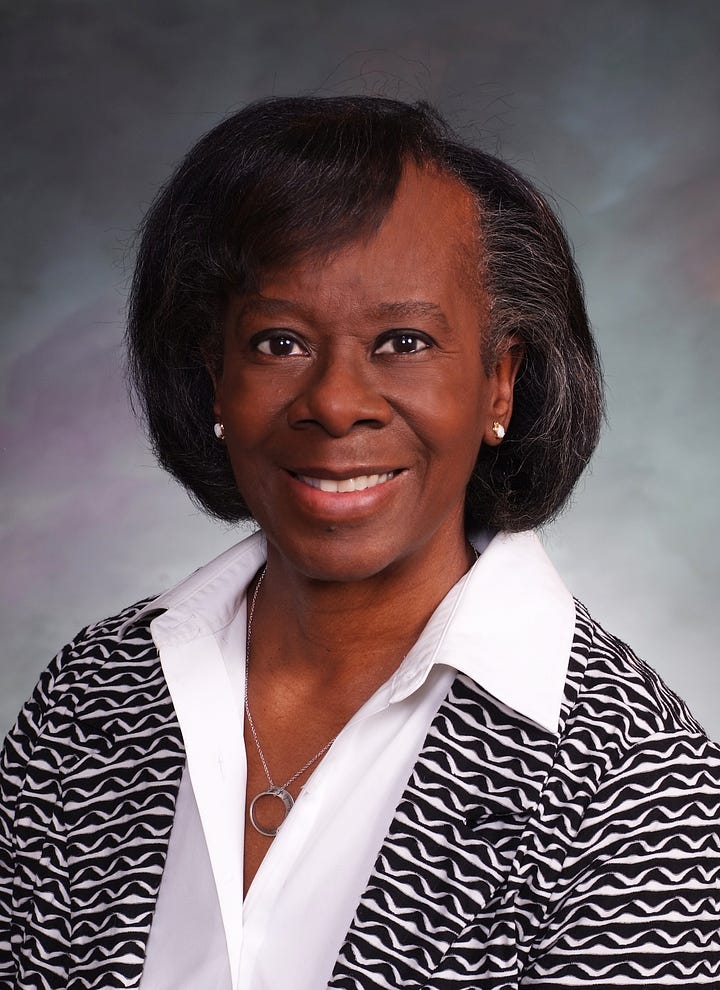University students fight for, win ‘life-saving’ legislation
The new law provides some legal immunity for those who report a drug overdose. “One mistake should not warrant me reading the obituary of those I love,” a UW student pleaded before lawmakers.

For more than a decade, University of Wyoming student leaders have wanted legal protections for their friends and classmates who seek life-saving care during a drug overdose.
The students won those protections earlier this month when Gov. Mark Gordon signed Senate File 74 into law.
“It’s just really important that students and Wyomingites are able to call for help in emergency situations without having any fear of legal repercussions,” said Sophia Gomelsky, a member of the student government who fought for the new law. “We’re the last state in the entire country to finally adopt this kind of legislation. So it’s good to see us making progress in harm reduction and reducing barriers to care.”
The legislation provides legal immunity from misdemeanor possession or use charges for someone who calls 911 during a drug overdose — whether that’s the individual experiencing the overdose or someone else witnessing it.
There are caveats, however. For example, the dialer must remain on scene and be honest with emergency responders to qualify for the immunity, and that immunity does not extend to felonies like intent to deliver or to alcohol-related charges.
But the new law — known as a “Good Samaritan” protection — tries to incentivize good faith bystander intervention by removing the threat of punishment from those who would otherwise fear it, like a friend who was doing drugs with the person now overdosing, or any individual who was simply present at a party where they knew illegal activities were occurring.
That fear of punishment is not unfounded.
In Wyoming, a designated Schedule I drug like cannabis could net an individual up to six months in jail, a $750 fine, or both if they were found using it. They could be hit with a fine of up to $1,000, a year in jail, or both for processing three ounces or less. Similar penalties exist for LSD, opioids, cocaine and more.
Advocates for overdose reporting protections say they don’t want individuals weighing the life-altering cost of criminal charges against the potentially life-threatening cost of inaction.
“We want people to get to life-saving care as quickly as possible,” Lindsay Simineo of the Wyoming Behavioral Health Alliance told lawmakers during a February committee hearing. “We recognize that time is of the essence, so any barriers that we can eliminate to encourage that help is incredibly beneficial.”



The issue is intensely personal for many young folks in Wyoming, including UW engineering student Jonathan Christensen, who testified to the Senate Labor, Health and Social Services Committee in January.
“I recently almost lost one of my closest family members because their friends’ fear of the government outweighed the will to call emergency services,” Christensen told lawmakers. “I never even knew about this until the day after, when I received a single text message telling me how close this member of my family was to dying. One mistake — and thank God they learned from it — but one mistake should not warrant me reading the obituary of those I love.”
Christensen is far from alone.
A campus survey conducted by the UW student government found that one out of five respondents said they had personally “refrained from calling for help during a drug- or alcohol-related emergency because of fear of legal consequences.”
The survey also showed unanimous student support for a statewide Good Samaritan law. When the weather allowed, students attended hearings in person in Cheyenne, testifying in favor of the bill. Others provided testimony via Zoom.
Ultimately, the Wyoming Senate voted 29-0 to pass the bill; the Wyoming House voted 58-0. Gomelsky told the Laramie Reporter she was at the capitol with other students the day the bill passed out of the lower chamber.
“We were just screaming and jumping up and down in the House lobby,” she said. “Not that everybody there was thrilled about that, but we were thrilled.”
The law follows more than a decade of activism on the part of students, and it portends a new chapter for Wyoming advocates of harm reduction — the catchall term for laws and educational resources that aim to make the pitfalls of drug use, like overdose or addiction, less prevalent and less lethal.
The law created by Senate File 74 takes effect in July.
The long road: The popular push for harm reduction
University students have pushed for the new protections since at least 2013, when the student government officially called for a set of changes to UW Regulations and the Student Code of Conduct that would have shielded overdose-reporting bystanders from university punishment for drugs or alcohol.
Those changes were never made.
During their one-year administration from May 2020 to May 2021, ASUW President Riley Talamantes and Vice President Courtney Titus kept the conversation about harm reduction alive, tying the push for those protections to the fraternity- and sorority-led push for a statewide anti-hazing law.
Most hazing deaths at U.S. colleges involve alcohol, and Talamantes said the same perverse incentive structure that stops people from seeking help during an overdose also stops underage college students from seeking help when they “are 18-19 years old and didn’t know their limits.”
“We had heard rumors about people in the [Fraternity and Sorority Life] community who would get super-wasted sometimes and be out in the snow because they cognitively didn’t know where they were at,” Talamantes said. “But then, rather than calling for any kind of help, people just have to keep things very hush-hush, which is incredibly dangerous.”
As with controlled substances, the possible criminal charges attached to illegal alcohol use can and do disincentivize reaching out for help. In Wyoming, minors and legal adults under the age of 21 can be hit with a fine of up to $750 for possession of alcohol.

“I think you’d be hard pressed to find a college-age student, or someone who’s been through undergrad, who doesn’t have a memory of a somewhat scary experience where it would have been nice to not have that fear,” Titus said.
The difficulty was not getting students on board, she added; it was pitching the idea to the powers that be.
Talamantes and Titus faced resistance from some on campus who viewed such drug- or alcohol-related immunities as “Get Out of Jail Free” cards — concerns that were echoed by lawmakers this session.
Sen. Lynn Hutchings (SD-5) argued “personal responsibility” should be enough to get people calling 911.
“I don’t think there’s any law that prevents you from reporting an overdose; it’s your fear that’s preventing you from reporting it,” Hutchings said. “If you’re in a gathering and you guys are drinking underage, taking drugs … you are disobeying the law.”
Hutchings’ complaints are illustrative of a conservative culture that’s hesitant about many harm reduction principles. During their tenure, Talamantes and Titus intentionally kept away from more “radical” harm reduction stances — like providing fentanyl test strips — fearing it would be a non-starter in deep red Wyoming.
But the push for overdose reporting immunity continued, gaining support from mental health organizations like the Wyoming Behavioral Health Alliance and WAMHSAC (the Wyoming Association of Mental Health & Substance Abuse Centers). Representatives from both organizations testified in support of the bill this session.
On campus, student leaders never lost the desire to secure legal protections for those who report overdoses.
“When I got to ASUW, that was just overwhelmingly what students were talking about and asking for,” said Gomelsky, who now serves on ASUW’s executive branch as the student government’s director of community and governmental affairs. “Especially with Fraternity and Sorority Life, they were really pushing and passionate about this.”
In 2024, state lawmakers began discussing Good Samaritan protections amid the interim — the time between legislative sessions when committees field testimony from experts and the public while hammering out legislation for the next winter’s session.
“When they eventually voted to sponsor [Senate File 74] for the general session, I knew that would be time for ASUW to step in,” Gomelsky said.
The student government launched its campuswide survey in the fall.
Student horror stories
In addition to finding that fear of legal repercussions has stopped 21% of respondents from calling for help when it was needed, the survey also collected student stories.
An open-ended question asked students to share the details of any “related instance or situation.” Their responses demonstrate a widespread and persistent issue.
“Right after high school a kid overdosed in my friends basement because they were all too scared to call the police,” reports one respondent.
Another writes:
I once gave a ride to a friend and her boyfriend after they had been drinking. Once we got to where they were staying he became increasingly unresponsive and we were concerned of alcohol poisoning or that he had been drugged. We hesitated to bring him to the hospital because of fears of legality as he was underage and finances. In the end we did bring him to the hospital where we found he had been drugged. People should never have to choose between their lives and their freedom.
Some respondents, including one from Colorado and another who worked as an EMT, shared that they had each personally witnessed another state’s Good Samaritan law save a life. The respondent from Colorado writes:
At a party in high school a girl was drinking while being on certain medications and passed out and started seizing. The people who didn’t know about the law yelled at everyone not to call the police and ran away from the scene. Luckily an ambulance was called by someone aware and the girl was taken to the hospital. If the law wasn’t a thing in Colorado the girl would’ve died because of other people’s fear of getting in trouble. As such the law should exist in Wyoming so situations like this wouldn’t happen.
Without such a law in Wyoming, young folks have made dangerous decisions in dangerous situations. One respondent admits:
My buddy in high school blacked out at a party and I didn’t know if they were okay but I couldn’t call anyone because I was drunk, so I drunk drove them home, miraculously no one was hurt and my buddy woke up soon enough.
Other situations have not ended so fortunately.
Multiple respondents shared stories of young people dying in Wyoming, specifically because those who should have called for help were weighing whether the situation was bad enough to risk the legal consequences.
One respondent regretted their own decision not to call for help:
Yes, last year a group of students I [knew] frequently used drugs and overdosed. I wasn’t using, but I didn’t call for help or report it. [One] of the students died a few days after the overdose, from other medical issues, likely exacerbated by drug related complications. If I’d reported the [overdose] and he’d [seen] medical attention, he might still be alive today.
Another writes:
I went to a funeral for a 19 year old because the people she was with when she ODed didn’t get her help. I don’t know their reasoning or even their names but I think of her almost every day of my life. She deserved to receive help and to still be alive today but she isn’t. If this law could save one person [then] it’s good enough for me. People make mistakes and they should not be left to die because of them. I honesty think this law should have less stipulations. People should be able to call for help without the worry of being arrested, period. end of discussion.
During the Senate committee hearing in January, Gomelsky called these accounts “the most moving piece of evidence as to why we need this law.”
“We all strongly believe this legislation will encourage individuals to seek help during emergency situations,” she said. “By providing protections for the people acting in good faith, we can save lives and reduce preventable harm and promote a stronger culture of care and safety in our communities.”
The mechanics, and limitations, of SF74
Senate File 74 was altered a few times as it moved through the Wyoming Legislature. Most amendments focused on the number of times individuals could make use of the immunity.
Gomelsky told the House committee in February that students were “hesitant” about placing limits of this sort on protection. The goal, she said, is sending a clear message that folks won’t get in trouble for doing the right thing.
“We recognize that it can be complicated in emergency situations, especially for young people,” she said. “We just want people to be on the safe side and to prioritize calling for help.”
But several lawmakers, including Hutchings, raised concerns that the immunity could be abused, and sought to limit it.
As originally written, the bill allowed an individual to lean on the new immunity twice in a 12-month period. Senators and representatives wrestled over whether this should be left as twice a year, amended to once a year, or removed altogether.
The final version of the bill landed on the original twice-a-year allowance.


Albany County Sen. Gary Crum (SD-10), who chaired the bill’s conference committee, said his fellow senators were concerned about students “abusing” the bill’s “hall pass.”
“It wasn’t an open-ended, always-forgiven type of thing,” Crum said. “We all settled on: it was going to be two times — using the example: once, it could be in the spring semester and then once in the fall. And hopefully it doesn’t become habitual, but that’s why it was two times a year. And that was really just an accountability piece.”
The final bill also requires that the person making use of the immunity enter a treatment program following the second time they use it. This amendment turned Hutchings’ ‘no’ vote to a ‘yes.’
“I didn’t want it to be broadened because I think it still allows these young lads, or women, to have this issue every year that they’re at the university,” said Hutchings, who also served on the conference committee. “But by broadening it and putting in the stipulation that they had to get medical help on that second time, I think that is awesome.”
The bill pertains only to drug overdoses and to misdemeanor possession and use charges. It does not pertain to alcohol poisoning and does not grant immunity from underage drinking citations or other charges.
As it stands, those reporting an overdose could still face criminal charges for underage drinking, or for having pipes, bongs or other drug paraphernalia.
Students, however, would like to see the law expanded to include some kind of immunity for these.
The ASUW survey showed 88% of respondents would like to see “a Good Samaritan law for certain underage alcohol offenses.” It also showed 89% would like to add immunity from other drug-related charges, such as those related to drug paraphernalia, which are not covered by the new law.
These extensions might be more difficult to pitch in culturally conservative Wyoming, but they’re not the only harm reduction tactics state residents are pursuing.
The path ahead: New directions for harm reduction advocates, student leaders
Former ASUW Vice President Courtney Titus said she’s happy to see the new protections added to state law.
Since graduating, Titus has gotten involved with the National Harm Reduction Coalition and now serves as the New York-based organization’s Wyoming engagement consultant. She said she’s aiming to translate harm reduction principles into policy that works for Wyoming.
Titus is working with the Wyoming Department of Health and the Fremont County-based Wind River Cares to host training sessions for public health professionals or others who might be able to put harm reduction principles into action. The first of these training sessions is planned for September.
The passage of Senate File 74 is a boon to these efforts, Titus said.
“It’s a foot in the door and it’s a step in the right direction,” she said. “Now, for the first time, we can say we do have some overdose protections. We don’t have to say, ‘You’re open for being fined or being charged or receiving a ticket or being detained.’”

Titus said the new law demonstrates the possibility of adapting and adopting harm reduction principles in Wyoming.
“To some degree, the government and the leaders of this state have said: ‘This is important to us, and we care about people’s wellbeing — and we care about people who use drugs’ wellbeing and we don’t want people to die,’” she said. “Which has never been said before at that level in Wyoming.”
The former student leader said it’s crucial that UW students were part of the push.
“This is the momentum that we have had for years, and what will keep us going,” she said. “Because when things are driven by the community — and driven by the population that is most directly affected — those policies will be shaped well, and they will serve the community well.”
Back on campus, ASUW will likely pursue additional political goals. In addition to its work on anti-hazing and overdose reporting, the student government supported the passage of local rental regulations — and denounced state efforts to repeal them.
This year, the student government took a stand against a bill that would have removed student IDs from the state’s list of valid voter IDs, and took a stand in favor of another bill called the Defend the Guard Act. Both pieces of legislation ultimately died.
ASUW also passed a resolution declaring its support for the continuance of the UW Lab School, which was the subject of failed legislation this session.
Going forward, Gomelsky wants to see the student government ramp up its presence in Cheyenne.
“ASUW hasn’t done a lot at the state level before, but that’s kind of something I’m hoping to get us more into doing,” she said. “[ASUW] is a primary voice for students in the state. Being able to represent them on a state level is, I think, really important.”
University students could reinvigorate the fight for an anti-hazing law, or push for legal immunities for alcohol-related medical emergencies, or any other legislation impacting the lives of students.
With two key victories in its recent past — the passage of Laramie’s rental regulations and now the passage of Senate File 74 — the future is brimming with potential, said Former ASUW President Riley Talamantes.
“One key reason that Laramie passed the landlord-tenant resolution several years ago was because it had been a conversation for students from the time that even I was a freshman,” she said. “We may find in the next couple of years, as more positive bills get passed through the state, that a lot of it was student-led.”




Wonderful to hear some rare good news coming out of the legislative session. Kudos to the students!
Hutchings needs to quit with the “personal responsibility” schtick. As do all of the other republicans who have said it for various reasons in the past. It’s hypocritical.